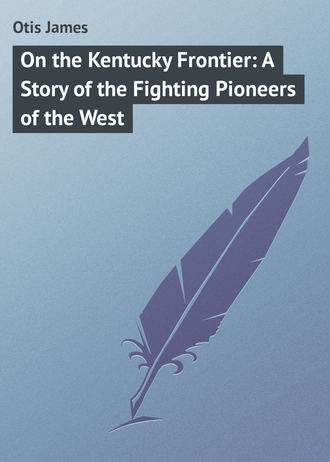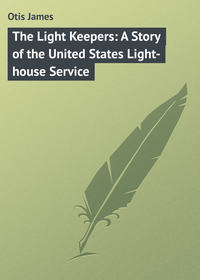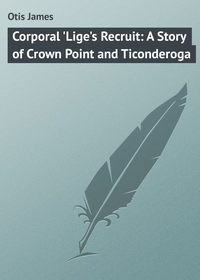 полная версия
полная версияOn the Kentucky Frontier: A Story of the Fighting Pioneers of the West
This was the moment when I should have confessed that but for Paul, he, Simon Kenton, would yet be bound to the tree; but the words were not spoken, and I have never ceased to regret that I did not make the explanation due my comrade.
As I read over what is here set down it seems much as if I had made it appear that we were giving little heed to whatever might be passing around us, when, as a matter of fact, we were keenly alive to all that went on, and lost no opportunity of dealing the painted fiends a deadly blow.
Nor were the other members of our party at all backward in doing their duty. As when we faced the savages further up the river, every man did his best, and this display of courage was not to the liking of such sneaks as had counted on shedding Simon Kenton's blood.
Within half an hour from the time the scout was set free, they began to draw back, and we pressed our advantage until such a blow had been dealt as must have taught them a lesson.
Then was heard Major Clarke's voice ordering the men back to the canoes, and within a few moments we were being ferried across to the flat-boat, where the other members of the expedition were waiting anxiously to learn the result of the venture.
There was no longer any urgent reason why we should remain silent, for the noise of the conflict had alarmed every painted snake within sound of the rifles, and our men discussed the situation without taking the precaution to speak in whispers.
The general belief appeared to be that these two parties whom we had fought since daybreak, were one and the same. Our first meeting was with those who were pushing on up the river in advance to spy out the land, and it was the main body that had made of Kenton a prisoner.
All that had happened was for the best. But for my folly many men might have been slain, and that folly would not have been committed but for the fact of the scout's having been taking prisoner.
Clearly the good God had interposed in our favor, and we were come out of the fights with nothing more serious than wounds which, if properly cared for, would soon heal.
Within half an hour from the time we stepped on board the flat-boat after having released Kenton, he insisted that Paul and I should lay down to sleep, and at the moment I believed this display of care for us arose from our efforts to release him at a time when death was looking into his face.
Having had no sleep the night before, we were only too glad to act upon his suggestion, and in a short time both of us lads were sleeping soundly as only tired boys can.
At midnight we came to understand why Kenton had been so solicitous for our welfare.
Then he aroused us, saying as we opened our eyes:
"I reckon you lads don't want to stay here any longer, an' it's time we were movin'?"
"Where are you going?" I asked sleepily.
"Ahead of the flat-boats. Unless we start now there's little chance we can do the party much good, an' I'm countin' on makin' a better job than was the first one."
It was not to my liking, this setting out in the middle of the night to drift through a country infested, as we had by this time every reason to believe, with savage enemies, and I failed to understand how we could be of benefit to the volunteers by sailing down the river in the darkness when we might pass an hundred bands of reptiles without having any suspicion they were near.
This much I said to Kenton, and he replied with a laugh:
"I reckon we can count on the river's bein' clear for the next thirty miles, an' after we've gone that far it'll be a case of layin' alongside the bank to wait for daylight, or takin' a quiet little scout ashore."
"As you did last night," I said quietly, giving but little heed to the words, and a second later I could have bitten my tongue for having made such a slip, for the scout said grimly:
"Perhaps it'll be as well if we don't talk much about last night. The lad who leaves a canoe to search for a comrade who's out scoutin', not havin' left any word as to where he might be goin', ain't in good trim to cast up old scores at others."
Now it was I understood why Simon Kenton had refrained from making any disagreeable remark when Paul told of our movements. He realized that we had done a reckless thing, but was not minded to say what might have hurt our feelings at a time when we had just aided in saving his life.
But for my quick tongue I should never have known that he realized fully all my folly.
It can well be fancied that, after this reminder that I was not to be trusted in time of danger, my lips remained closed, and in silence I set about making ready for the journey.
The dugout which Kenton had decided to take was lying alongside, and in her had already been placed such a supply of provisions as we might need.
There was little for Paul and I to do save get our sleepy eyes wide open, and clamber over the side of the flat-boat, a task which we performed in silence.
Major Clarke was awake to give us his final instructions, and after he had held a private conversation with Kenton, the latter came into the canoe, casting off the hawser as he said in answer to a whispered remark of the commander's:
"Never fear but that I know full well what may happen, an' you can count on my bein' more careful than before."
I had an idea that these words might have reference to my foolishness of the night previous, and did not seek to learn what Major Clarke had been warning him against.
We pushed off into the darkness, our light craft moved quickly away by the rapid current, and almost immediately it seemed as if we were wholly alone in the wilderness once more.
Save to keep the canoe in mid-stream, Kenton made no effort to direct her movements, and we floated down the river in silence, keeping sharp watch on either bank while I promised myself never again to be guilty of giving way to fear.
Paul, brave lad that he was, held his peace. Thus far he had covered himself with the glory which can be gained when one is pitted against such enemies as were ours, and the fact that I had not given him full credit when there was an opportunity for so doing, only caused me to feel the more keenly that he was my superior even though having had no previous experience.
I guessed that the current carried us a good five miles an hour. The distance from Corn Island to the rendezvous at the mouth of the Tennessee River was said to be considerably more than three hundred miles, and at the rate of progress made by the heavy boats, lying by during the night as they did, it would require full six days in which to make the journey.
We in the canoe could not look forward to less than five days of this drifting on the river, in case we met with no delay, and while I thought of my mother it seemed as if we were going to the other side of the world. I wondered whether I might ever see her again, and it appeared much as if the chances were against our meeting, judging from the dangers into which we had already run when the voyage was hardly more than well begun.
By this dwelling upon the possibilities I soon worked myself into a most cowardly frame of mind, from which I did not awaken until we were come to a long stretch of sandy land either side of the river, where there was no fear our enemies could find a hiding-place.
Then it was that Simon Kenton started a conversation, as if knowing I needed cheering, and he did not bring it to a close until we were near the wooded portion of the shores again.
When daylight came we had seen nothing to cause alarm, although all knew full well that we might have passed scores of savages without being aware of the fact, and the scout paddled the boat toward the western shore, as he said in a low tone:
"I'm countin' on havin' a look around, lads, an' this time you'll stay quietly aboard till I come back, or the flat-boats heave in sight."
Paul, understanding that these words were somewhat in the nature of a reproof to me, said boldly:
"It was well for you, Simon Kenton, that Louis insisted on going ashore, else the sun had never risen again for your eyes."
"All that I know right well, lad, an' I'd be a brute if I didn't give the fact due weight; but I'm not willin' you should put your own lives in peril for me. You've got people who love you, while I – "
He ceased speaking suddenly as if having said more than he intended, and again my tongue was an unruly member.
"Haven't you any kin who would mourn because of your absence?" I asked, and Simon Kenton's face grew pale, bronzed though it was by the weather.
"The less that's said about me the better," he replied curtly, and then, the canoe being alongside the bank, he sprang out to make her fast, thus putting an end to further words.
He was absent no more than half an hour, during which time Paul and I sat motionless and silent, hidden by the foliage, from the view of any who might pass either by land or water.
When he returned we knew he had seen no signs of danger, although not a word was spoken until we were a mile or more from the halting place. Then he said quietly:
"I reckon we've already met all the reptiles who are roamin' hereabout, an' that we shan't run our noses into any more fights this side of the Tennessee River. We'll keep a sharp lookout just the same, though, an' pull up to-night so's not to get too far ahead of the volunteers."
As he said so we did. During the day we drifted with the current seeing naught of danger, and at nightfall pulled the canoe up under the overhanging foliage to enjoy a good night's rest.
The story of this day's journey was that of the days which followed until we were come to the rendezvous, arriving, as we believed, not more than four and twenty hours in advance of Major Clarke's force.
Since the day when Simon Kenton was made prisoner we had seen no signs of the foe, and it seemed certain that then we had come upon the only warlike band outside the British outposts.
When we stepped from the canoe at the mouth of the Tennessee River I drew in a long breath of relief, for at that moment I was nearer exhaustion than I ever believed would be possible when one has done nothing more than remain inactive.
To sit in a narrow boat like our dugout day after day, not daring to move lest she should be overset, is real labor. I had never had much experience in such traveling, and felt that I really needed no more.
We made camp by building a lean-to of light stuff, and while Simon Kenton went back into the thicket to search for game of some kind, Paul Sampson and I lounged lazily about, enjoying to the utmost the possibility of stretching our limbs at full length.
The scout was yet absent when we saw emerge cautiously from the foliage four white men, and but for the fact that they carried a goodly supply of meat, thus showing they had been out hunting, I might have suspected them to be British spies.
As it was, I did not feel at liberty to give any especial information concerning ourselves, and warned Paul to be on his guard against speaking of the flat-boats; but rather to let them believe we were simply journeying down the river in search of a homestead location.
As a matter of course the sharp-eyed hunters saw our lean-to immediately they emerged, from amid the underbrush, and came directly toward us.
In the wilderness men are either enemies or friends; there is no half-way ground as amid townspeople, and I at once decided in my mind that these newcomers might be depended upon, although I wished most heartily for Simon Kenton, who could, take the responsibility of receiving them.
Their first question was as to whether we were alone, and on being told who was our companion and leader, one of the party expressed the greatest pleasure at meeting him once more.
"I've scouted an' trapped with young Kenton," the hunter said warmly, "an' a better friend I never hope to have. Where are you headin', lads?"
I stammered, not willing to give much information until we knew more regarding the strangers, and yet hesitating to refuse an answer to a simple question, when Paul said quickly, relieving me of my embarrassment:
"If you know Simon Kenton, sir, you can well understand that it does not become us boys to speak of his purpose. He has gone in search of meat, and will soon return to answer for himself."
"Well, said, lad. You have a cautious tongue, an' it's needed hereabouts, because some of us have white enemies as well as red. We can wait for Kenton, an' meanwhile there'll be no great harm done if we set to work cookin' a bit of this 'ere game."
Then the men took possession of our poor camp, and the odor of meat cooking was soon rising on the evening air, sharpening our appetites until, but for the shame of it, I would have begged some of the food before it had more than been browned by the flames.
The meal was not yet prepared when Simon Kenton appeared, and I was rejoiced to see him greet the hunters as if they had been old friends, for it told that during this night at least we had nothing to fear.
Without hesitation he explained the purpose of our coming, and told of the flat-boats with their loads of volunteers which might be expected on the morrow, whereupon the strangers seemed highly gratified.
It appeared, as I soon learned by the conversation, that these men had come from Kaskaskia; but were by no means on friendly terms with the commander of the British post there.
They were in sympathy with the efforts of the colonists to shake off the yoke which the king had put upon them, and declared their purpose to join Major Clarke's force, if that officer should be willing to receive them.
"I'll answer for it that the major gives you a hearty welcome," Kenton said in a tone of satisfaction, "an' by your aid we shall be able to surprise the outpost."
Then the conversation ceased in order that all hands might partake of the meal, which by this time was prepared, and we two lads felt that the most dangerous portion of the enterprise was over, although at least two British garrisons were yet to be captured.
CHAPTER IX.
KASKASKIA
During this evening and the following day we gained all the information concerning Kaskaskia which it was necessary Major Clarke should know.
These men who had come upon us so opportunely, were, as I have said, trappers from that outpost, and eager to do whatsoever they might toward overthrowing the rule of the Britishers on our frontier.
Such desire was only natural, as may be believed when I say that the king's officers pursued the policy of stimulating the Indians against the settlers, in order that such as were not willing to own allegiance to the king should be killed or driven from the country.
Monsieur Rocheblave, a Frenchman, had command of the British forces roundabout Kaskaskia, and the hunters reported him to be an exceedingly vigilant officer, who kept a large number of spies continually on the alert to guard against the approach of people from Kentucky who were known to have taken sides with the eastern colonists in the struggle for liberty.
There were eighty British soldiers in the garrison, and all the redskins nearabout were in the pay of the commandant, therefore it might be said that the force at this point was exceeding strong; but Simon Kenton's friends believed it might be taken by surprise, providing we could capture the spies sent out by Rocheblave.
Once our people appeared before the garrison, when the Indians were not there to lend their aid, the post must of a necessity surrender, and thus the work set for us to do might be accomplished without bloodshed.
That this renegade Frenchman was exerting himself to stir up the Indiana against the settlers there could be no question; in fact one of these hunters had good proof that such was the case, he having been present when the king's officer offered a certain reward in the shape of ammunition and blankets if the savages would surprise and massacre a number of families who had made a clearing on the banks of the Mississippi River.
Kaskaskia was founded, as I have read, after the visit of La Salle to the Mississippi in 1683, by Father Gravier, Catholic missionary among the Illinois Indians, and was the capital and chief town of the Illinois country so far as the French continued in possession of it. In 1763, it was ceded by the French to Great Britain, and such of the French officers as held possession were continued in the pay of the English king.
With the exception of fifteen or twenty, such as the hunters whom we met, all the settlers in that vicinity were of French descent.
The day following our arrival at the mouth of the Tennessee River was spent in idleness. We had a plentiful supply of meat, and the hunters were unwilling to talk or think of anything save the possible capture of the outpost from whence had been sent so many murdering bands of savages to shed blood simply that the king's hold upon this fair country might be the stronger.
Therefore it was we remained idle, wasting our time, as I thought, until an hour past noon, when Paul and I had wandered a short distance up the river in company with Simon Kenton and the hunter whom he had greeted as a friend, and then were spoken those words which lifted from Simon Kenton's heart the greatest burden man can bear.
Several times since he so suddenly appeared to me on the bank of the Ohio River, having come at a time when he could render my mother and myself the greatest possible service, had he commenced a sentence regarding himself, and suddenly stopped, as if fearing to betray somewhat of his own life which others should not know.
Such behavior, together with the fact that he refused to say anything concerning his early life, or why he was serving as a scout when it would seem as if nature had fitted him for some noble purpose, convinced me, boy though I was, that there was a painful secret which had sent him out from among those whom he loved.
On this day of which I speak, while we were strolling aimlessly up the river, the hunter said carelessly, giving no particular weight to his words:
"I met Donnelly at Cahokia a short time ago, and we spoke of you, Simon."
Kenton stopped suddenly as does a man when a bullet reaches a vital spot in his body. His face turned pale as I had seen it once before, and he trembled as if in an ague fit, striving to speak, but in vain, and the hunter, alarmed by this show of weakness, would have sprung forward to prevent the scout from falling, but the latter waved him aside as he asked in a tremulous whisper:
"Which Donnelly did you meet?"
"He whom you have reason to know; perhaps it would have been better if I said that Donnelly who has good cause to remember you."
"Do you mean Martin?" Simon Kenton asked with an effort, and showing yet greater evidence of being disturbed in mind.
"Ay, lad, Martin Donnelly, and why should you, above all others, show fear at his name?"
"Tell me!" and Kenton leaned forward eagerly, as if his very life depended upon the answer. "Do you mean to say you spoke with that Martin Donnelly who lived some time ago in Fauquier County, in the colony of Virginia?"
"Ay, Simon, the same. He whom you flogged until the breath had-well nigh left his body."
"And he lives?" Kenton asked with a long indrawing of the breath, straightening himself up as does one who has been suddenly relieved of a heavy burden.
"He was alive when I met him in Cahokia, and counted on settling down in the Illinois country, if it so chanced everything was favorable. He left his family in Virginia so I understood; but reckoned on going after them some time this fall."
Kenton leaned against a tree, his face hidden in his arm, and we three stood gazing at him in silence and astonishment until perhaps ten minutes had passed, when he turned to face us with an expression such as I shall never forget.
"If you have made no mistake, John Lucas," he said, speaking slowly, and with a ring of joy in his tone, "if you have spoken truly, there is taken from me that which I believed I must carry to my grave, and from there to the presence of my God. If Martin Donnelly be alive, I am a free man once more – "
"I tell you, Simon, I saw and talked with Martin Donnelly," Lucas exclaimed impatiently. "What is the meaning of your words? Why have you not always been a free man, save perchance when the savages had you in their clutches, as these lads here have told?"
"Here is the story of a man who came on the frontier believing himself a murderer, and doing whatsoever he might to atone for a supposed crime committed at a moment when anger held possession of him. As you know, I was born in Fauquier County in 1755, where my father, an Irishman, had won for himself by hard labor such a home and such a plantation as a poor man could survey with pride. Up to the time I was sixteen years old there came no thought into my mind save to be a planter, and continue the work my father had begun. Then I loved a girl, the daughter of our nearest neighbor, and counted, with the consent of her parents as well as mine, on marrying her in due course of time. Martin Donnelly came into the district, and by unfair means, as I did and still claim, won her from me. I met him the day after he was married. He taunted me with what he had done; claimed that an Irish planter in Virginia was of so little consequence that the first newcomer could take from him whatsoever he had that was to be won by fair words, and continued in such strain until rage overpowered me. I leaped upon him like a panther, using no weapons; and with my bare hands pommeled him until he lay like one dead. Fear took the place of anger; I tried to rouse him; but he lay as does a corpse, and I, believing myself a murderer, fled, pursued only by my own conscience, across the Alleghanies, where I joined those who were pushing forward on the extreme frontier. Since that day have I shunned the abode of all men save those who live remote from any settlement. How often I have yearned to see my father and mother, there is no need for me to say. I dared not go back, believing I would be seized and executed as a murderer; but now I am free to do whatsoever I will, and save for the fact that my word binds me to remain as scout with Major Clarke until the expedition comes to an end with the capture of Vincennes, I would set off this hour for the home I have dreamed of, but never expected again to see."
Having thus spoken Simon Kenton walked rapidly away up stream, and we three, awed by his story, and knowing that at such a time it would be best to leave him alone, returned to the camp, I for one feeling that however great a failure might be Major Clarke's expedition so far as concerned the British outposts, it was wondrously successful, inasmuch as through it there had been lifted from one man the shadow of a great crime.
Not until nearly nightfall did the scout rejoin us, and then all traces of his emotion had vanished. He was much the same person as before, and yet entirely different, if I may use so contradictory an expression. I mean that there was no change in his manner so far as could be seen when we spoke of the purpose of our journey, or of that which was to be done in the future; but when talking with Paul and me there was a gladsome ring in his voice – a certain freedom of manner which struck me forcibly, and yet might not have been evident to one who was unacquainted with all the facts.
More than once during the evening he referred to the day when he was to go back to Virginia, and during the remainder of the journey it was as if all his future actions were marked out with especial reference to that visit, only lately become possible.
Not until noon of the following day did the first of the flat-boats come in sight, and it was the advice of these hunters from Kaskaskia that we set out on the march up the Mississippi without delay, lest Monsieur Rocheblave's spies should give that officer timely warning of our coming.
Immediately Major Clarke came on shore Simon Kenton informed him of what we had learned, and the four hunters announced their desire to accompany the expedition from this point as guides.
Nothing could have been more favorable to the enterprise, and, as may be readily supposed, the major did not hesitate to accept their services.
The volunteers, all good men and tried, were speedily acquainted with the facts of the case, for in such an enterprise as this the commander made no effort to conceal his intentions from those who accompanied him, and it was believed by every one that no time should be wasted at this point on the river.









